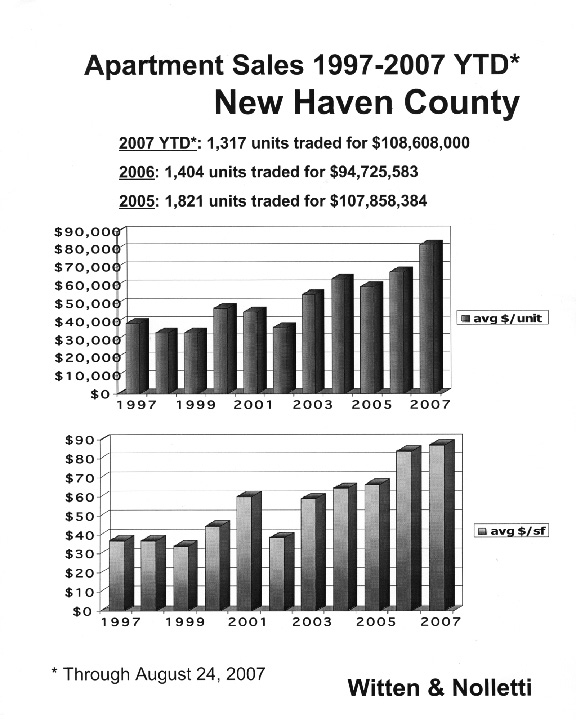The New Haven apartment market will remain healthy this year, with demand underpinned by tightening lending standards and steady regional economic expansion. By year-end 2008, New Haven will have expanded its employment by 2.9%, adding 10,735 jobs since 2003, 9,500 of which have been generated by the educational and health services sector. While in recent years, the metro has experienced a moderate shift in hiring towards the higher-paying business and health services industries, near-term regional economic expansion will likely center on the educational and health services, and leisure and hospitality sectors. These sectors have led economic expansion with five-year annual growth of 2.3% and 1.9%, respectively. In 2008, the educational and health services sector is expected to add 2,300 jobs, covering the steady losses of roughly 5,600 manufacturing jobs over the course of the past five years.
The median income has grown 18.6% over the past five years, keeping up with the U.S. median, and is expected to increase by an additional 2.5% in 2008 to $63,000 per year. The region's single-family housing market in New Haven is pressuring renter demand, as the median home price is relatively equitable for local residents. Median home prices have advanced 10.3% annually over the most recent five-year period, but prices are expected to ease in 2008. Although a slide in home prices should help affordability improve, the fallout of the subprime mortgage industry will continue to cause lenders to tighten standards. As a result, more people will be forced into the rental market, further supporting supplemental demand for New Haven's apartments.
Multifamily inventory has risen an average of 1.2% annually since 2003, as builders have brought approximately 1,300 new units online. Long-term indicators show an increase in supply, as developers have 34 projects in the planning pipeline, which, upon completion, will add another 4,000 apartment units to inventory. Developers are focusing their efforts on the more contemporary mixed-use developments, drifting away from the condominium market that has dominated the new project pipeline in recent years. The New Haven/Harborside submarket - comprised of the cities of East Haven, New Haven and West Haven - has been the most active in terms of development and sales activity, with properties near the U.S. 1/I-95 exchange receiving the most attention from investors and developers. The submarket's attractiveness is the result of a combination of revitalization efforts of the downtown CBD, and its proximity to transit routes as well as New Haven harbor.
The steady rise in apartment stock, coupled by the increase in housing affordability, has resulted in a 50 basis point up tick in vacancy this year followed by a forecasted 30 basis point rise to 5.6% by year-end 2008. Rent growth for apartment units will slow next year. In 2007, asking and effective rents grew 4.8% and 4.3%, respectively. Next year, asking rents are expected to advance 3.5% to $1,116 per month while effective rents will rise 3.1% to $1,073 per month. Despite the rise in vacancy, fundamentals for apartment properties will remain favorable in 2008.
Out-of-state investors have been increasing their activity in the metro. Many of the investors are coming from neighboring states, including New York, New Jersey and Massachusetts, as a result of the relatively affordable per unit cost as well as the availability of higher cap rates of New Haven properties. Moving forward, while long term market fundamentals remain stable and prices in New Haven are relatively affordable, the recent uncertainty in the credit markets and higher borrowing costs has caused a slowdown in the investment market.
Steve Witten is a senior director in the New Haven office of Marcus & Millichap's National Multi Housing Group.
Tags:
Greater New Haven apartment market expected to remain healthy into 2008
November 19, 2007 - Connecticut










